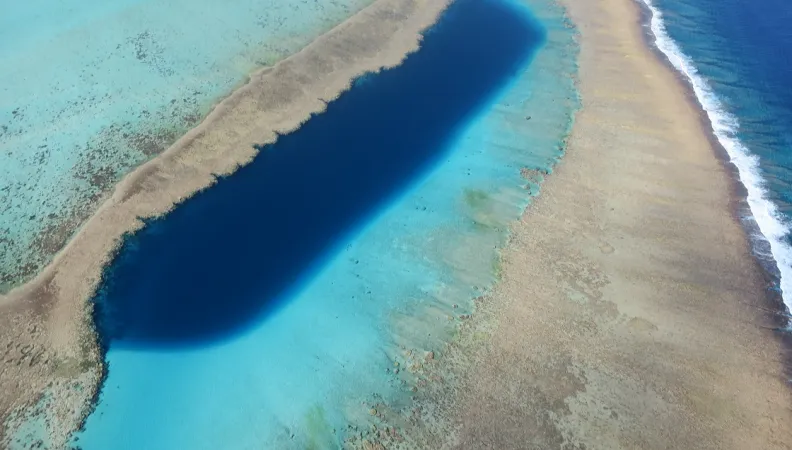Share the page
The Kiwa Initiative: A Coalition to Protect Biodiversity
Published on

A coalition spanning the globe, from Canada to New Zealand has joined forces to use nature-based solutions to help communities in the Global South better adapt to climate change. AFD, the European Union and Australia are among the partners at the center of the innovative Kiwa initiative, which promotes the protection of biodiversity to improve adaptation and resilience. The initiative builds on an unprecedented collaboration between IUCN, the Pacific Community and the Pacific Regional Environment Programme, which together will provide support to beneficiaries across the region.
The French President announced the Kiwa Initiative at the “One Planet Summit” in 2017. It has been operational since March 2020, and has received €35 million in grants (XPF 4.2 billion), uniting five international donors – Australia, Canada, France, New Zealand and the European Union – to address common challenges such as the protection of biodiversity and adaptation to climate change through nature-based solutions in Oceania.
The result of a Franco-European dynamic, one of the initiative’s main aims is to facilitate access to green financing for people in the Pacific and to promote collaboration between regional and international financial partners, as well as regional cooperation.
Protecting Pacific biodiversity: a major challenge
There is, without doubt, urgent need for action. While Pacific island states and territories account for only 0.03% of global greenhouse gas emissions, they are particularly vulnerable to the effects of climate change and the risk of damage to their ecosystems. “Oceania is currently home to six of the world's 35 ‘hotspots,’” says Caroline Edant, Senior Climate and Biodiversity Advisor for AFD's Pacific Ocean Regional Office in Noumea. “These areas of the planet that have a rich wealth of species and that are under serious threat.”
A quarter of all coral reefs, the most biologically diverse ecosystems, lie in the Pacific. For the 30,000 plant species identified across the region, the rates of endemism, meaning when a biological species is native to a single defined geographical area, are extremely high, between 75% and 90%.
For further reading go to: Kiwa Initiative, download the leaflet
“Today, some of this unique biodiversity has already been lost due to environmental pollution, the destruction of natural habitats by fire, the introduction of invasive species and the impact of climate change,” says Caroline Edant. Notably, this region has the highest number of threatened species in the world. More than 1,200 bird species have become extinct in Oceania over the last three thousand years.
Nature-based solutions: an alternative to conventional engineering
Given that the area is highly vulnerable to climate change, nature-based solutions have an important role to play in combating the problem. “These types of solutions involve actions that aim to protect, sustainably manage and restore endangered ecosystems to adapt to climate change, while preserving biodiversity,” says Caroline Edant. “For example, restoring forest ecosystems in the Pacific region will offer greater protection against flooding and will help prevent landslides. The restoration of mangroves will protect the residents, the infrastructure and productive land along the coasts from the risk of storms and cyclones.”
Further reading: “Nature-Based Solutions”: Making Nature an Ally
Kiwa is also innovative for the collective determination of its five international partners to combine their efforts to support Pacific Island States and Territories in addressing a common challenge. The project governance ensures a unique space for mutual dialog. This is France's first collaboration for development aid with its Canadian, Australian and New Zealand partners, in line with the French government’s strategy in the Indo-Pacific. Also, the initiative will provide support to regional projects being implemented in island states as well as French territories in the Pacific.
A collaboration unparalleled in scale
To ensure the initiative’s success, it is based on an unprecedented collaboration, launched on November 18, 2020 in Noumea when three financing agreements were signed between AFD, the Pacific Community (SPC), the Pacific Regional Environment Programme (SPREP) and the International Union for Conservation of Nature (IUCN), as part of the 50th session of the Committee of Representatives of Governments and Administrations (CRGA) of the SPC. SPREP and SPC will be the main scientific and technical intergovernmental organizations in the region that will provide support to potential beneficiaries.
The initiative is committed to working at local level with calls for projects being managed by IUCN in 18 Pacific Island States and Territories, as well as at regional level via a help-desk for regional projects, which will be monitored by its Secretariat, located in Noumea within AFD's Pacific Ocean Regional Office. AFD is working on a five-year timeline for the project's implementation.
Further reading: the Kiwa Initiative page
